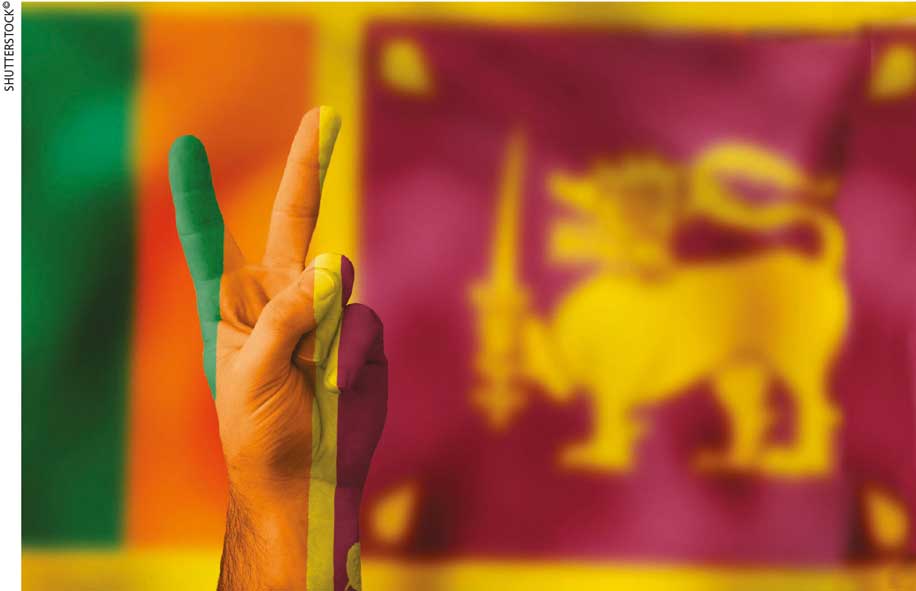NATIONAL RECONCILIATION
CAPITALISING ON OPPORTUNITIES
Dr. Jehan Perera stresses the importance of pursuing postwar reconciliation

An iconic photograph from recent times exhibits the joy on then President Mahinda Rajapaksa’s face when he embraced his brother, then Secretary to the Ministry of Defence and Urban Development Gotabaya Rajapaksa, shortly after the latter survived a suicide bomb attack at the height of the war.
The brothers however, have different strengths and constituencies. Different groups follow and advise them – and each would prefer if their leader was the first among equals.
On his part, the president has been promoting the institution he once served and to which most of his confidantes belonged or continue to belong. The military is where the closest of human bonds can be forged because on the battlefield, each depends on the other for his or her life.
In the early period of his time in office, the president promoted the military – both serving and retired – wherever he could as ambassadors to foreign nations, COVID-19 monitors and a supra grade of administrators in government departments.
It is often the case that those appointed aren’t the best suited to the tasks they’ve been mandated with. But the president evidently trusts them and they form his support base.
However, there is a need to challenge the excesses: Rajapaksa’s pardoning of a soldier who was held by several courts for deliberately killing eight children and adults off the battlefield may be due to his conviction that loyalty to the military counts most.
He’s expected to uphold the system of checks and balances, and favouring one institution at the expense of others could weaken the entire governance structure.
Unlike any president in the past, Rajapaksa is not a member of a political party. Civil society organisations have periodically called for a non-party presidency that is nonpartisan in decision making.
Civil society can provide constructive support on various issues, the most important of which is national reconciliation. And there are indications that the government is shifting its stance on postwar reconciliation.
Rajapaksa’s election victory on a highly nationalist platform won him most of the Sinhalese ethnic majority’s votes. The government felt empowered to publicly declare its intention to withdraw from the reconciliation process initiated by its predecessor with support from the international community. This was followed by withdrawal from UN Human Rights Council (UNHRC) Resolution 30/1 of 2015.
However, the four subsequent internationally driven resolutions against Sri Lanka emanating from Geneva (UNHRC), Ottawa (the Ontario parliament), Washington D.C. (the US Congress) and Brussels (the European Parliament) seem to have led the government to rethink its reconciliation policy. All four have human rights and the ethnic conflict as their centrepiece.
Though not yet publicly commented on, the signs of change are twofold.
The first is the US embassy’s increased visibility in meeting with the Tamil and Muslim parties. The media reported that embassy officials discussed postwar reconciliation efforts, devolution of power, the rule of law and the Prevention of Terrorism Act with Sri Lanka Muslim Congress (SLMC) leader Rauff Hakeem.
Another delegation led by US Ambassador to Sri Lanka and Maldives Alaina B. Teplitz held similar discussions with Tamil National Alliance (TNA) leader R. Sampanthan focussing on the proposed new constitution.
The second sign of change was a tweet from Rajapaksa with regard to pursuing reconciliation in partnership with the UN and according to international standards. This poses a rare opportunity to make a true mark and leave a legacy.
Government leaders have been engaging with members of civil society to obtain their inputs on the way forward. But the path ahead isn’t likely to be easy. This is a government that campaigned on an entirely different political platform.
The challenge for this administration will be to convince ethnic and religious minorities that it is serious about the new reconciliation process it’s looking to put in motion. Confidence building measures are needed prior to making changes that require cooperation from those on the opposite side.
If the president is to address the problem that has eluded a solution since independence and been the main stumbling block to Sri Lanka’s development, he will need to broad base his support at multiple levels.
He needs the support of the ruling party led by his brothers as well as civil society, and also that of the ethnic minority and opposition parties. This will require patience, dialogue and self-sacrifice.




